ECCT LCI participates in 2014 EPIF: Report for 13 March
Report for 13 March
Event 1: APO (Asia Productivity Organization) International Conference
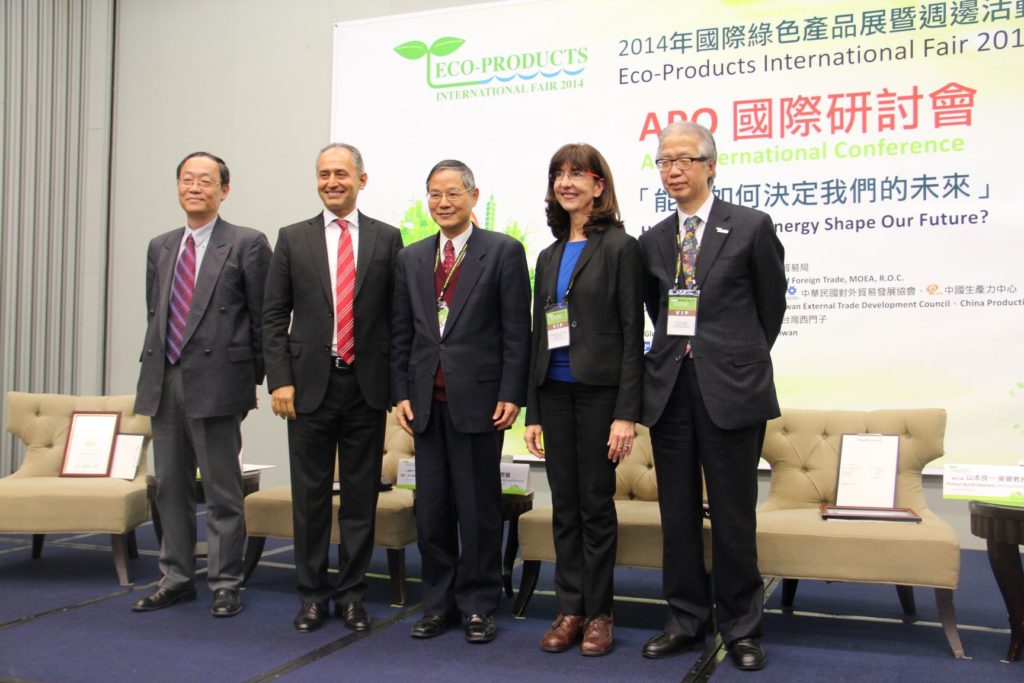
Event 2: Sustainable Real Estate Development Roundtable
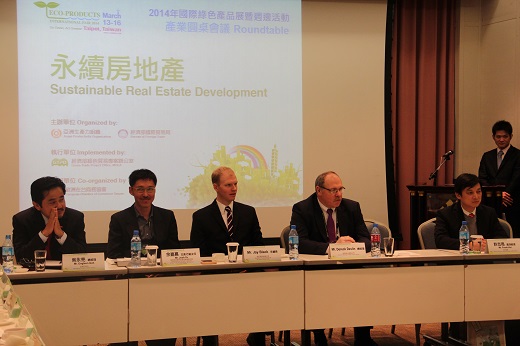
Event 3: EPIF Gala Dinner with President Ma
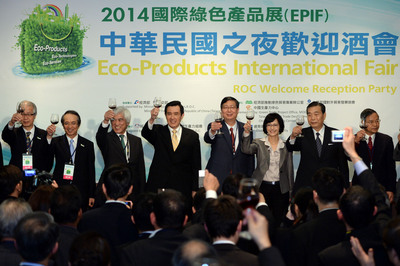
How Green Energy Will Shape Our Future
Time: Thursday March 13, 13:30 -17:10 PM
Audience: 300
LCI Speaker: Erdal Elver, President & CEO, Siemens Limited Taiwan
Topic: Answers for a sustainable energy future
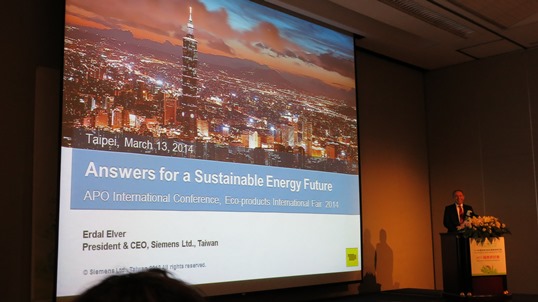
The megatrends urbanization, demographic change, climate change and globalization are shaping our future. With the need to improve the quality of life, the environment and economic competitiveness, we have to become more resource-efficient and environmentally-friendly. As an integrated technology company, Siemens offers a wide range of solutions to meet the growing demand for energy of today andtomorrow. The company has the broadest environmental portfolio in the world which covers the entire energy chain. This presentation outllined some of Siemens' answers – in the fields of green manufacturing, clean energy, green buildings, green hospitals, green mobility, and smart grids – to shape a sustainable future.
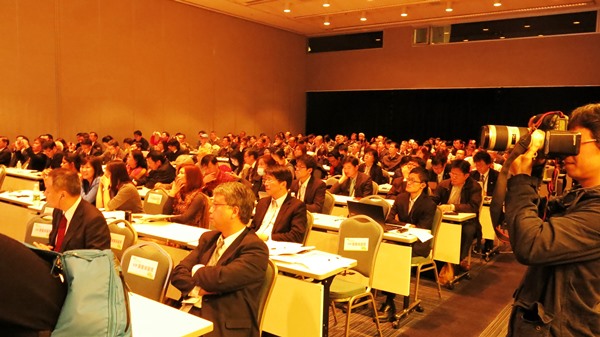
Industry Roundtable
Sustainable Real Estate Development Roundtable
Moderator: Josh Yu, North America Marketing Director, Green Trade Project Office, Ministry of Economic Affair
The roundtable featured industry experts, including three speakers from the LCI and a panel discussion exploring how sustainability can have an impact on investment and value.
LCI Speaker: Dereck D Devlin, General Manager, Atlas Copco Taiwan Limited
Topic: Sustainable Productivity
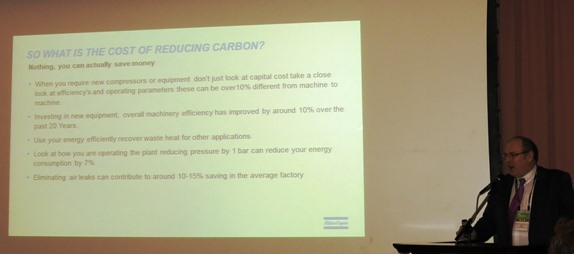
Sustainable productivity is a motto used every day at Atlas Copco and the company's commitment is to make performance stand the test of time. Reducing carbon in industry often comes with a high price tag because it is usually costly to take action but in the case of compressors this is not the case, according to Devlin. Many people don't actually have a clear understanding of how much carbon is released in everyday life. Driving a car 7,000-8,000 km produces about one tonne of carbon while a plane travelling 13,000 kilometres produces an average of one tonne of carbon per person.
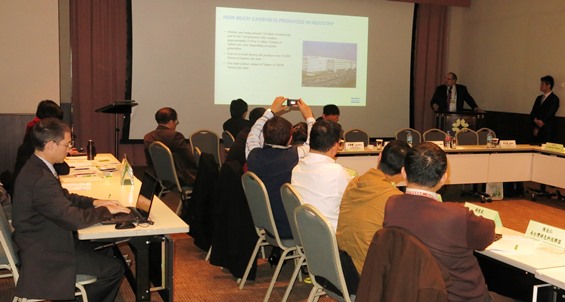
Compressed air is required for a lot of applications and it is very expensive. By using the best air compressors, substantial energy savings of 35% can be realized. One of Atlas Copco's customers requires the entire output of one power station just to produce the compressed air it needs. This produces 750,000 to one million tonnes of carbon a year, a fairly large amount considering that Taiwan produces a total of 258 million tonnes of carbon a year. There are many ways to reduce carbon emissions as well as save money. Taking the example of his customer, Devlin said that just a 1% reduction in energy could result in a cut of 7,500-10,000 tonnes of carbon or the equivalent of taking 5,000 cars off the road for a year.
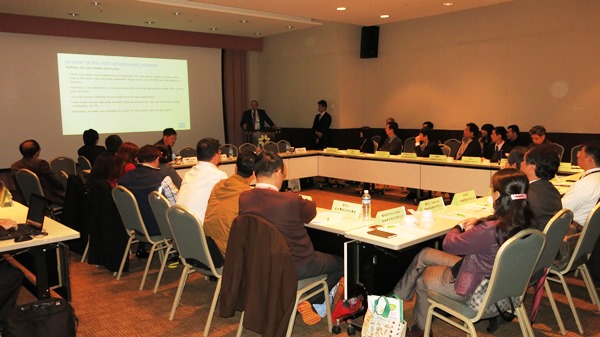
Atlas Copco's variable speed drive compressors can reduce energy consumption by up to 35% and the company is now working on a new compressor that can increase this saving by up to 50%. They are also "using energy twice" by using the heat generated from running a motor for other uses. Devlin stressed the need to look not just at the cost of new equipment but also at the life cycle costs. It is also important to make sure that maintenance is done regularly on equipment to keep it running smoothly. Devlin concluded that great solutions are available now and it is much better to install the best equipment at the outset to reduce emissions rather than purchase carbon offsets.
LCI Speaker: Englong Goh, Managing Director, BASF Taiwan
Topic: Chemistry for a sustainable future
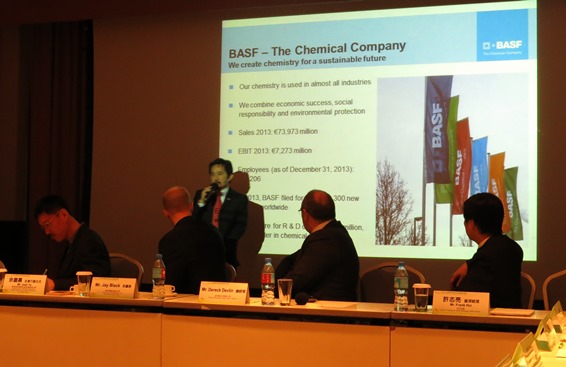
As the world's largest chemical company, the company's motto and mission is to create chemistry for a sustainable future. Goh quoted David Ritter from the Lansea Group who said that a perfectly sustainable building uses technology to enhance its performance. Building energy efficient houses is a key element for a sustainable future given the amount of energy they consume. A sustainable building is made with durable technologies and materials. Sustainability requires durability, resource efficiency, climate protection, energy efficiency, affordability, comfort, health and safety.
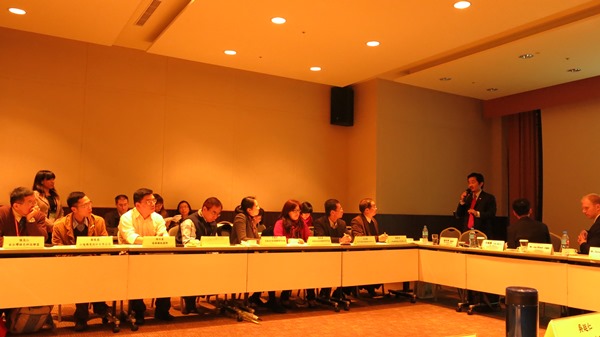
Creating the right environment for sustainability requires partnership between all three major stakeholders: government, industry and society. Government is crucial to set the right regulations and standards and enforce the rules. Industry needs to keep innovating and developing sustainability solutions while the general public needs to keep pressure on both the government and industry to improve as well as monitor the results.
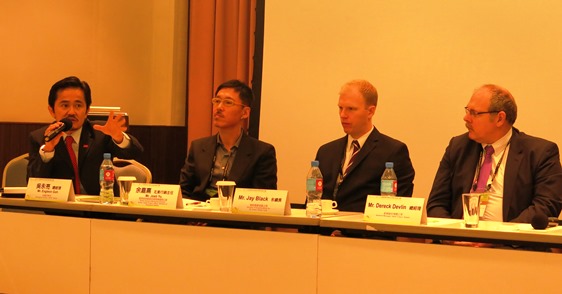
Taiwan is already very innovative and efficient in certain industrial processes but the same rigour is not applied to building design, energy conservation and reducing waste. There are multiple kinds of sustainable materials available for buildings such as insulation for walls and roofs (poorly insulated roofs are a major factor in a building's energy consumption). With the right wall and roof insulation, glass and other materials in place, it is possible to cut air-conditioning usage by 80%. While it is better to design and construct buildings using the best materials and methods, it is not necessary to always start from scratch. Old buildings can be renovated to improve their insulation and energy consumption.
LCI Speaker: Frank Hui, Senior Technical Sales Manager, ABB Taiwan
Topic: Renewable energy solutions
In 2013 ABB acquired Power One, a leading provider of renewable energy and energy-efficient power conversion and power management solutions, positioning ABB as a leading global supplier of solar inverters, which play a critical role in converting the sun's energy into electric current and controlling its flow into the power system. Power-One has one of the market's most comprehensive offerings of solar inverters, ranging from residential to utility applications, and a broad global manufacturing footprint. It also has a power solutions portfolio that complements ABB's business. Hui noted that the solar industry has seen rapid development but without government subsidies it has struggled in recent years. However, at the same time prices of solar panels have dropped sharply, thereby improving the economic viability of solar energy. Solar roof and other panel installations are widespread in Europe but very limited in Taiwan. Hui spoke at length about the science behind solar energy and how to maximize efficiency and energy throughout the process from the efficiency of the panels to the transmission of electricity and how to reduce waste in the process.
EPIF Gala Dinner with presence of President Ma

EPIF gala dinner photos please see ECCT FB.
President Ma greeted the APO Delegation and VIPs including ECCT Chairman Giuseppe Izzo during a 30-minute meeting in the VIP room ahead of a special gala dinner.
After President Ma's welcome the gala dinner began. ECCT Chairman, CEO, and 20 ECCT LCI members enjoyed exquisite catering service and met with the Vice President of Fujitsu, the Vice Chairman of China Airlines, the SL Green Realty Corp. Director of Green Sustainability, the Taiwan Institute for Sustainable Energy President, the Mackay Medical College Dean of General Affairs and ITRI representatives.
